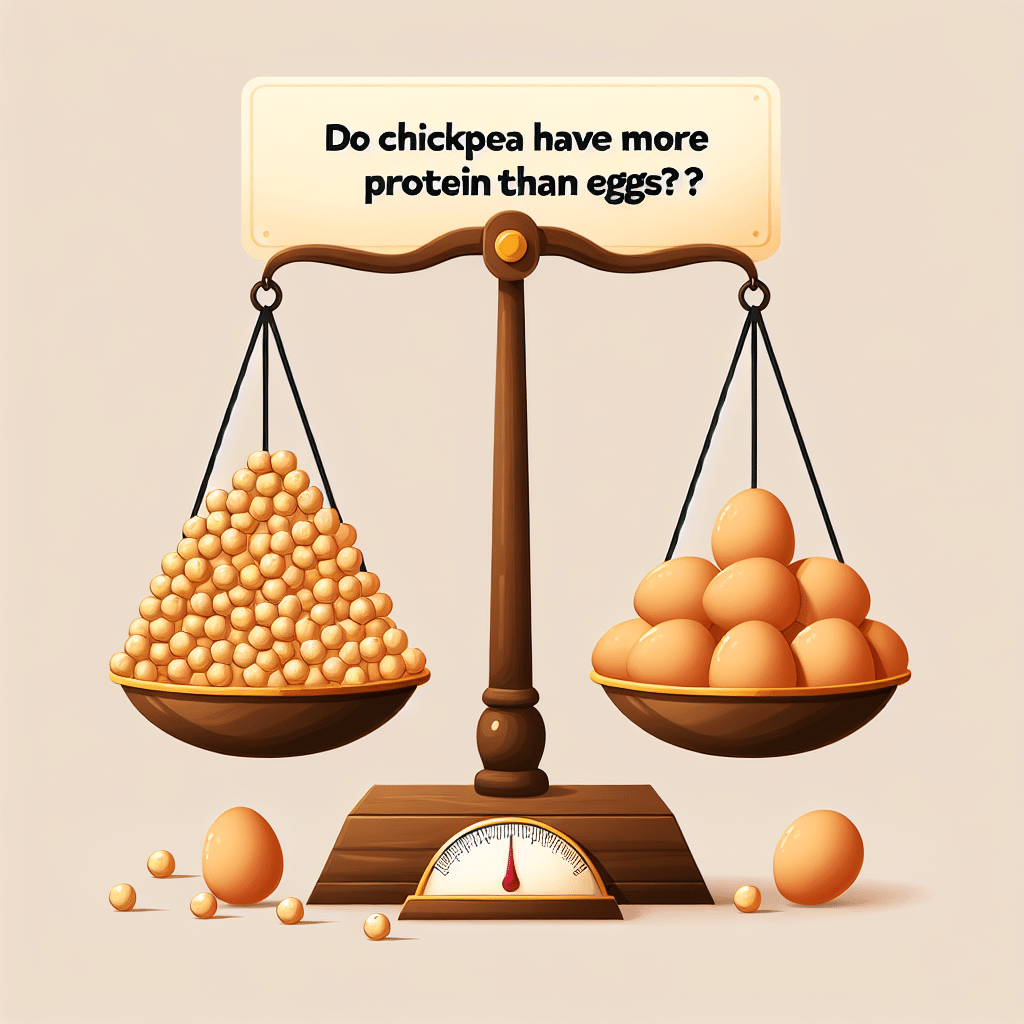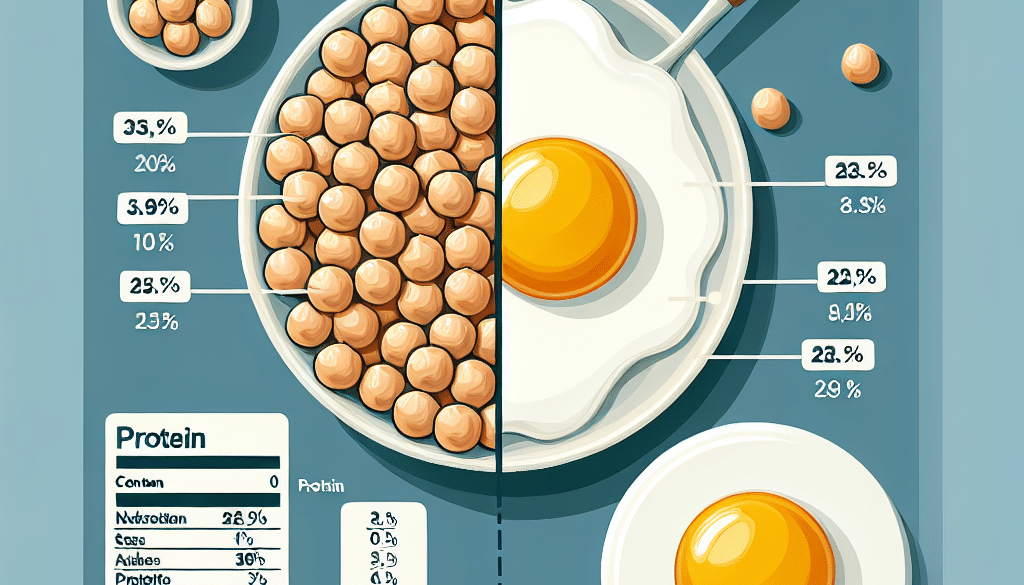Do Chickpeas Have More Protein Than Eggs?
-
Table of Contents
- Chickpeas vs. Eggs: A Protein Comparison
- Understanding Protein in Our Diet
- Protein Content in Chickpeas
- Protein Content in Eggs
- Comparing Chickpeas and Eggs
- Nutritional Benefits Beyond Protein
- Chickpeas:
- Eggs:
- Environmental and Ethical Considerations
- Conclusion: Balancing Your Protein Sources
- Discover ETprotein’s High-Quality Protein Products
Chickpeas vs. Eggs: A Protein Comparison

When it comes to protein sources, consumers are often on the lookout for the best options to include in their diets. Two popular choices are chickpeas and eggs, both of which are praised for their protein content. But which one offers more protein? This article delves into the nutritional profiles of chickpeas and eggs, comparing their protein content and discussing the benefits of each.
Understanding Protein in Our Diet
Protein is a macronutrient essential for building muscle mass, repairing tissues, and producing enzymes and hormones. It’s a vital component of every cell in the body, and getting enough protein is crucial for maintaining good health. While animal products are known for their high protein content, plant-based sources are gaining popularity for their additional health benefits and sustainability factors.
Protein Content in Chickpeas
Chickpeas, also known as garbanzo beans, are a type of legume that has become a staple in many diets around the world. They are not only rich in protein but also contain fiber, vitamins, and minerals. A one-cup serving of cooked chickpeas contains approximately 14.5 grams of protein. This makes them an excellent source of plant-based protein, especially for vegetarians and vegans.
- High in fiber
- Rich in vitamins and minerals
- Contains antioxidants
Protein Content in Eggs
Eggs are often referred to as a “complete protein” because they contain all nine essential amino acids that the body cannot produce on its own. A single large egg offers about 6 grams of protein. Eggs are also a source of other nutrients, such as vitamin D, B vitamins, and choline.
- Contains all nine essential amino acids
- Source of vitamin D and B vitamins
- Provides choline, which supports brain health
Comparing Chickpeas and Eggs
When comparing the protein content of chickpeas and eggs, it’s important to consider the serving size and the form in which they are consumed. While a cup of chickpeas provides more protein than a single egg, eggs have a higher protein density. This means that per gram, eggs contain more protein than chickpeas.
However, the choice between chickpeas and eggs may also depend on dietary preferences and restrictions. For those following a plant-based diet, chickpeas are a clear winner, while others may prefer the protein density and taste of eggs.
Nutritional Benefits Beyond Protein
Both chickpeas and eggs offer additional nutritional benefits that go beyond their protein content:
Chickpeas:
- Rich in dietary fiber, which promotes digestive health
- Contain iron, potassium, and magnesium
- Low in fat and free of cholesterol
Eggs:
- Provide essential fatty acids
- Contain lutein and zeaxanthin, which support eye health
- High in bioavailable nutrients that are easily absorbed by the body
Environmental and Ethical Considerations
For those concerned with environmental sustainability and ethical eating, chickpeas may be the preferred choice. They have a lower carbon footprint compared to animal products and do not raise the same ethical concerns associated with animal farming. Additionally, chickpeas can be a part of regenerative agriculture practices that improve soil health.
Conclusion: Balancing Your Protein Sources
In conclusion, both chickpeas and eggs are valuable sources of protein, each with their own set of benefits. Chickpeas offer more protein per cup, but eggs have a higher protein density. The choice between the two may come down to dietary preferences, ethical considerations, and nutritional needs. Incorporating a variety of protein sources, including both animal and plant-based options, can help ensure a balanced and nutritious diet.
Discover ETprotein’s High-Quality Protein Products
If you’re looking to diversify your protein intake, ETprotein offers a range of organic bulk vegan proteins that can complement your diet. Their products are non-GMO, allergen-free, and feature a neutral taste, making them an excellent addition to various recipes. Whether you’re interested in rice protein, pea protein, or other plant-based options, ETprotein has you covered.
About ETprotein:
ETprotein, a reputable protein and L-(+)-Ergothioneine (EGT) Chinese factory manufacturer and supplier, is renowned for producing, stocking, exporting, and delivering the highest quality organic bulk vegan proteins and L-(+)-Ergothioneine. They include Organic rice protein, clear rice protein, pea protein, clear pea protein, watermelon seed protein, pumpkin seed protein, sunflower seed protein, mung bean protein, peanut protein, and L-(+)-Ergothioneine EGT Pharmaceutical grade, L-(+)-Ergothioneine EGT food grade, L-(+)-Ergothioneine EGT cosmetic grade, L-(+)-Ergothioneine EGT reference grade and L-(+)-Ergothioneine EGT standard. Their offerings, characterized by a neutral taste, non-GMO, allergen-free attributes, with L-(+)-Ergothioneine purity over 98%, 99%, cater to a diverse range of industries. They serve nutraceutical, pharmaceutical, cosmeceutical, veterinary, as well as food and beverage finished product distributors, traders, and manufacturers across Europe, USA, Canada, Australia, Thailand, Japan, Korea, Brazil, and Chile, among others.
ETprotein specialization includes exporting and delivering tailor-made protein powder and finished nutritional supplements. Their extensive product range covers sectors like Food and Beverage, Sports Nutrition, Weight Management, Dietary Supplements, Health and Wellness Products, and Infant Formula, ensuring comprehensive solutions to meet all your protein needs.
As a trusted company by leading global food and beverage brands and Fortune 500 companies, ETprotein reinforces China’s reputation in the global arena. For more information or to sample their products, please contact them and email sales(at)ETprotein.com today.














